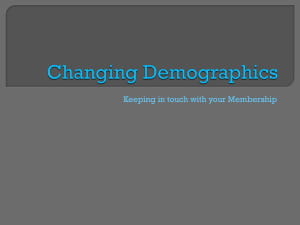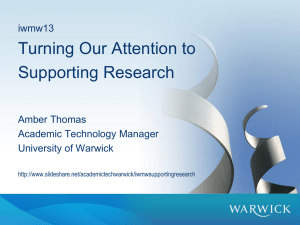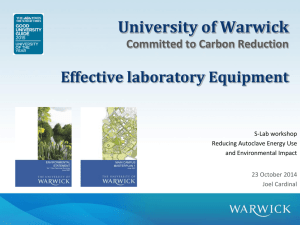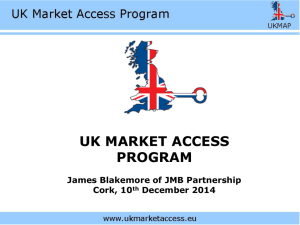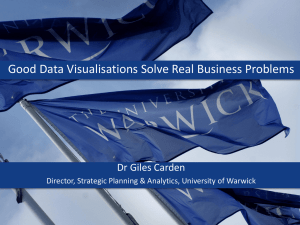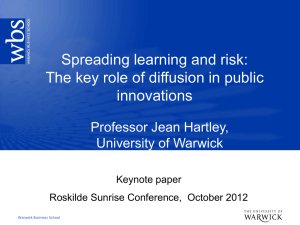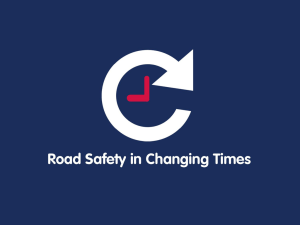Shirley Lerner lecture engagemen
advertisement
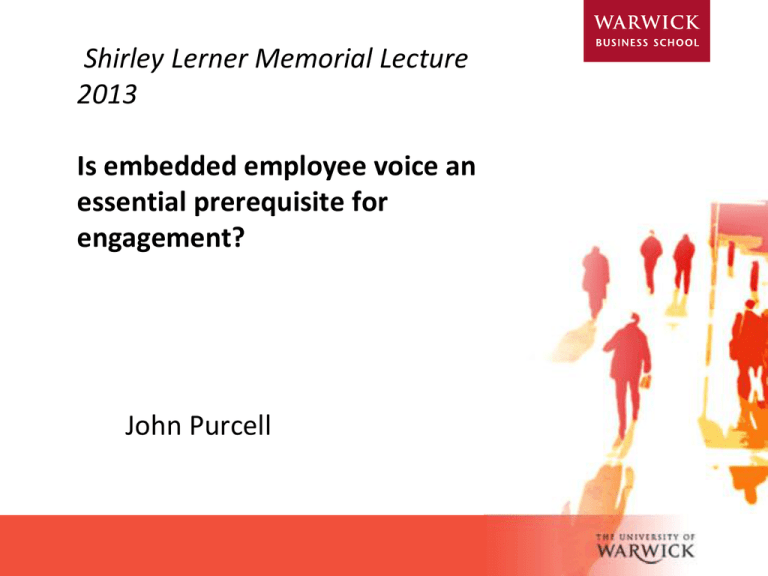
Shirley Lerner Memorial Lecture 2013 Is embedded employee voice an essential prerequisite for engagement? John Purcell Controversies in employee engagement Psychologists focus on ‘state’ engagement in doing the job. A focus on the individual HRM and employment specialists look at behavioural engagement linked to the organisation or unit recognising the firm as a social entity ‘Engagement with the organisation rather than the job may be more meaningful in theory and in practice (Truss et al 2013) The need for sophisticated measurement Warwick Business School 2 What is engagement? Commitment to job and organisation plus positive behaviour: the engaged employee But commitment to what? The job, line manager, colleagues, customers and the organisation Commitment and engagement to the job can be especially important for professionals Job satisfaction is important Job satisfaction and organisation commitment predict levels of engagement (not vice versa) Warwick Business School 3 The link with employee perceptions of the employment relationship Perceived organisational support (POS) was the only significant predictor of both job and organisational engagement (Saks 2006) Organisational engagement a strong predictor of all of the positive outcomes - lower sickness absence, fewer quits, more cooperative behaviour, advocacy POS: perceptions that the organisation supports me, interested in me, allows me to perform and be developed : psychological well-being Leading to reciprocation and social exchange Warwick Business School 4 The antecedents of engagement POS strongly associated with perceptions of fairness, justice and trust at the level of the job (and thus the vital role of line managers) and at the organisational level (top management) The emphasis is on processes of managing relationships both individually and collectively POS is not about good pay, job security and development (classic HR) although these help Warwick Business School 5 Fairness ‘When employees feel they are being treated fairly they reciprocate through performance of organisation citizenship behaviour (OCB) To be fair procedures should be consistent, free from bias, ensure accurate information is collected, mistakes corrected, conforms with ethics and morality, ensure that opinions of groups affected are taken into account Perceived fairness of resource allocation decisions are especially important Warwick Business School 6 Justice Four forms of organisational justice: Distributive, Procedural, Interactional and Informational Increasingly procedural justice is linked to interactional, or interpersonal justice as the most important sources of justice perceptions ‘procedural justice judgements play a major role in shaping people’s reactions to their personal experience ... In particular being treated with respect, helping to provide identity security’ Warwick Business School 7 Informational justice ‘informational justice perceptions are shaped through accounts and explanations by organisational authorities about reasons why certain procedures were chosen and why certain outcomes distributed in a certain way’ Informational justice is especially important in positively influencing employee attitudes and behaviour in change initiatives, especially in difficult times Warwick Business School 8 Trust Trust, like engagement, is a risk since it requires hope for the future and expectations of leaders that they are competent, benevolent, have integrity and are predictable Trust in the immediate manager is often quite high. The problem is trust in senior managers Warwick Business School 9 The most important factors shaping commitment/engagement 1. 2. 3. 4. Employee trust in management Satisfaction with work and job Involvement in decision making at work Climate of relationships between management and employees 5. Satisfaction with pay 6. Job challenge 7. Sense of achievement from work Source WERS 2004 analysis. Warwick Business School 10 Low levels of trust in senior managers CIPD 2011 employee outlook survey: only a minority trusted directors/senior managers, and had confidence in them. One third of civil servants had confidence ‘in the decisions made by ... senior managers. 27% felt that change is managed well’, 32% agreed they had an opportunity to contribute my views before decisions are taken that affect me. [about the same in the private sector ‘consult about important decisions’] Warwick Business School 11 The latest evidence from WERS 2011 Managers are getting better, slowly. 57% of employees surveyed agreed that their managers are sincere in attempting to understand their views (55% in 2004) 43% were satisfied with the amount of involvement they had in decision taking, but still a minority (40% in 2004) It is important. 85% of those satisfied with their involvement felt proud to work for their organisation compared to 35% who were dissatisfied Warwick Business School 12 Trust and collective engagement Engagement is not just about individuals, it is a group-led activity as captured in ‘work climate’ ‘trust in senior managers and strong employee-line manager relationships constitute key components of the “organisational climate” required for engagement to flourish’ (Rees et al 2013) Warwick Business School 13 Voice as the critical link with fairness, justice and trust ‘leadership, engaging managers and integrity’ – 3 of MacLeod and Clarke’s enablers of engagement Voice was underdeveloped as the 4th enabler Direct voice focussed on direct communication and involvement through team briefing, workforce meetings, problem solving groups, employee surveys + informal line manager discussions on task allocation, change, problem solving: Living procedural and interactional justice Warwick Business School 14 Collective voice and informational justice Senior managers are usually out of the loop in terms of shop floor voice systems yet they make the key decisions Collective voice in union partnerships or consultative committees in union and non-union organisations means senior managers briefing employee representatives on major plans, exploring the need for a decision, explaining the strategic narrative and working through the consequences and implementation plans Warwick Business School 15 Linking direct and strategic voice systems Where embedded voice practices on the shop floor, led by front-line managers, co-exist with top level consultative committees, run by senior managers, the effect on organisational commitment and employee engagement is greater than each by themselves (Purcell and Georgiades 2007) Warwick Business School 16 Voice is about perceptions of fairness, justice and trust People will still rate a procedure as fair ‘if they had a voice, even if they knew that what they said had little or no influence on the decisions made ... Voice has a value beyond its ability to shape decision making processes and outcomes’ Voice is critical for a positive ‘work climate’ supportive of engagement. Voice is needed at both the team and the strategic levels and needs to be embedded Warwick Business School 17 Strategic voice is under-developed in the UK Unions no longer provide routes to collective voice with collective bargaining covering 17% of private sector workforce and membership down to 14% in 2010 No signs of a take-up of consultative committees in either union or non-union workplaces. ICE Regulations largely ignored But good evidence that active consultation can be effective as judged by managers and employee representatives Warwick Business School 18 Building better employee voice at the strategic level Political support is needed to revise the Regulations and promote consultation. Election 2015? The EU could be more active in enforcing ICE and challenging UK Regulations. Recent ‘fitness test’? Much more union action to promote consultation. Signs that Unite is more active, TUC more positive? And what of employers? They often say consultation is a good thing (but fear the consequences) Warwick Business School 19 Further reading Catherine Truss et al Employee Engagement in Theory and Practice Routledge (in press 2013) Mark Hall and John Purcell Consultation at Work: Regulation and Practice OUP 2012 John Purcell and Mark Hall ‘Voice and Participation in the Modern Workplace: challenges and prospects’ Acas Future of Workplace Relations Discussion Paper March 2012 John Purcell ‘The limits and possibilities of employee engagement’ Warwick Papers in Industrial Relations No 96, Warwick Business School Warwick Business School 20
